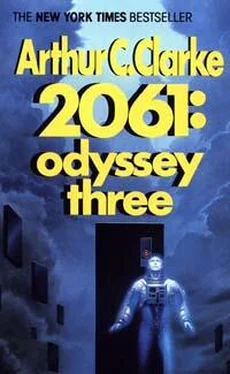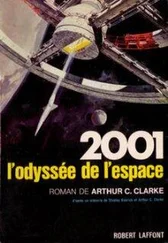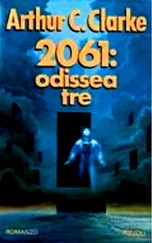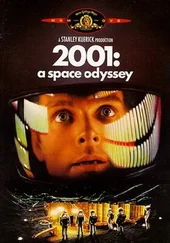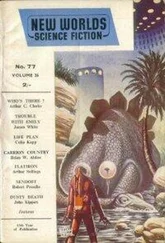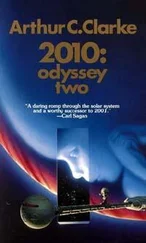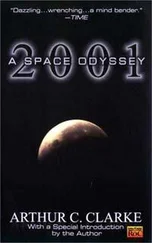Arthur Clarke - 2061 - Odyssey Three
Здесь есть возможность читать онлайн «Arthur Clarke - 2061 - Odyssey Three» весь текст электронной книги совершенно бесплатно (целиком полную версию без сокращений). В некоторых случаях можно слушать аудио, скачать через торрент в формате fb2 и присутствует краткое содержание. Жанр: Фантастика и фэнтези, на английском языке. Описание произведения, (предисловие) а так же отзывы посетителей доступны на портале библиотеки ЛибКат.
- Название:2061: Odyssey Three
- Автор:
- Жанр:
- Год:неизвестен
- ISBN:нет данных
- Рейтинг книги:3 / 5. Голосов: 1
-
Избранное:Добавить в избранное
- Отзывы:
-
Ваша оценка:
- 60
- 1
- 2
- 3
- 4
- 5
2061: Odyssey Three: краткое содержание, описание и аннотация
Предлагаем к чтению аннотацию, описание, краткое содержание или предисловие (зависит от того, что написал сам автор книги «2061: Odyssey Three»). Если вы не нашли необходимую информацию о книге — напишите в комментариях, мы постараемся отыскать её.
2061: Odyssey Three — читать онлайн бесплатно полную книгу (весь текст) целиком
Ниже представлен текст книги, разбитый по страницам. Система сохранения места последней прочитанной страницы, позволяет с удобством читать онлайн бесплатно книгу «2061: Odyssey Three», без необходимости каждый раз заново искать на чём Вы остановились. Поставьте закладку, и сможете в любой момент перейти на страницу, на которой закончили чтение.
Интервал:
Закладка:
ALL THESE WORLDS ARE YOURS – EXCEPT EUROPA.
ATTEMPT NO LANDINGS THERE.
The brilliant new star, which had banished night except for the few months in each year when it was passing behind the Sun, had brought both hope and fear to mankind. Fear – because the Unknown, especially when it appeared linked with omnipotence – could not fail to rouse such primeval emotions. Hope – because of the transformation it had wrought in global politics.
It had often been said that the only thing that could unite mankind was a threat from space. Whether Lucifer was a threat, no-one knew; but it was certainly a challenge. And that, as it turned out, was enough.
Heywood Floyd had watched the geopolitical changes from his vantage point on Pasteur, almost as if he was an alien observer himself. At first, he had no intention of remaining in space, once his recovery was complete. To the baffled annoyance of his doctors, that took an altogether unreasonable length of time.
Looking back from the tranquillity of later years, Floyd knew exactly why his bones refused to mend.
He simply did not wish to return to Earth: there was nothing for him, down on the dazzling blue and white globe that filled his sky. There were times when he could well understand how Chandra might have lost the will to live.
It was pure chance that he had not been with his first wife on that flight to Europe. Now Marion was part of another life, that might have belonged to someone else, and their two daughters were amiable strangers with families of their own.
But he had lost Caroline through his own actions, even though he had no real choice in the matter. She had never understood (had he really done so himself?) why he had left the beautiful home they had made together, to exile himself for years in the cold wastes far from the Sun.
Though he had known, even before the mission was half over, that Caroline would not wait, he had hoped desperately that Chris would forgive him. But even this consolation had been denied; his son had been without a father for too long. By the time that Floyd returned, he had found another, in the man who had taken his place in Caroline's life. The estrangement was complete; he thought he would never get over it, but of course he did – after a fashion.
His body had cunningly conspired with his unconscious desires. When at last he returned to Earth, after his protracted convalescence in Pasteur, he promptly developed such alarming symptoms – including something suspiciously like bone necrosis – that he was immediately rushed back to orbit. And there he had stayed, apart from a few excursions to the Moon, completely adapted to living in the zero to one-sixth gravity regime of the slowly rotating space hospital.
He was not a recluse – far from it. Even while he was convalescing, he was dictating reports, giving evidence to endless commissions, being interviewed by media representatives. He was a famous man, and enjoyed the experience – while it lasted. It helped to compensate for his inner wounds.
The first complete decade – 2020 to 2030 – seemed to have passed so swiftly that he now found it difficult to focus upon it. There were the usual crises, scandals, crimes, catastrophes – notably the Great Californian Earthquake, whose aftermath he had watched with fascinated horror through the station's monitor screens. Under their greatest magnification, in favourable conditions, they could show individual human beings; but from his God's-eye-view it had been impossible to identify with the scurrying dots fleeing from the burning cities. Only the ground cameras revealed the true horror.
During that decade, though the results would not be apparent until later, the political tectonic plates were moving as inexorably as the geological ones – yet in the opposite sense, as if time was running backwards. For in the beginning, the Earth had possessed the single supercontinent of Pangaea, which over the aeons had split asunder. So had the human species, into innumerable tribes and nations; now it was merging together, as the old linguistic and cultural divisions began to blur.
Although Lucifer had accelerated the process, it had begun decades earlier, when the coming of the jet age had triggered an explosion of global tourism. At almost the same time – it was not, of course, a coincidence – satellites and fibre optics had revolutionized communications. With the historic abolition of long-distance charges on 31 December 2000, every telephone call became a local one, and the human race greeted the new millennium by transforming itself into one huge, gossiping family.
Like most families, it was not always a peaceful one, but its disputes no longer threatened the entire planet. The second – and last – nuclear war saw the use in combat of no more bombs than the first: precisely two. And though the kilotonnage was greater, the casualties were far fewer, as both were used against sparsely populated oil installations. At that point the Big Three of China, the US and the USSR moved with commendable speed and wisdom, sealing off the battle zone until the surviving combatants had come to their senses.
By the decade of 2020-30, a major war between the Great Powers was as unthinkable as one between Canada and the United States had been in the century before. This was not due to any vast improvement in human nature, or indeed to any single factor except the normal preference of life over death. Much of the machinery of peace was not even consciously planned: before the politicians realized what had happened, they discovered that it was in place, and functioning well...
No statesman, no idealist of any persuasion invented the 'Peace Hostage' movement; the very name was not coined until well after someone had noticed that at any given moment there were a hundred thousand Russian tourists in the United States – and half a million Americans in the Soviet Union, most of them engaged in their traditional pastime of complaining about the plumbing. And perhaps even more to the point, both groups contained a disproportionately large number of highly non-expendable individuals – the sons and daughters of wealth, privilege and political power.
And even if one wished, it was no longer possible to plan a large-scale war. The Age of Transparency had dawned in the 1990s, when enterprising news media had started to launch photographic satellites with resolutions comparable to those that the military had possessed for three decades. The Pentagon and the Kremlin were furious; but they were no match for Reuters, Associated Press and the unsleeping, twenty-four-hours-a-day cameras of the Orbital News Service.
By 2060, even though the world had not been completely disarmed, it had been effectively pacified, and the fifty remaining nuclear weapons were all under international control. There was surprisingly little opposition when that popular monarch, Edward VIII, was elected the first Planetary President, only a dozen states dissenting. They ranged in size and importance from the still stubbornly neutral Swiss (whose restaurants and hotels nevertheless greeted the new bureaucracy with open arms) to the even more fanatically independent Malvinians, who now resisted all attempts by the exasperated British and Argentines to foist them off on each other.
The dismantling of the vast and wholly parasitic armaments industry had given an unprecedented – sometimes, indeed, unhealthy – boost to the world economy. No longer were vital raw materials and brilliant engineering talents swallowed up in a virtual black hole – or, even worse, turned to destruction. Instead, they could be used to repair the ravages and neglect of centuries, by rebuilding the world.
And building new ones. Now indeed mankind had found the 'moral equivalent of war', and a challenge that could absorb the surplus energies of the race – for as many millennia ahead as anyone dared to dream.
Читать дальшеИнтервал:
Закладка:
Похожие книги на «2061: Odyssey Three»
Представляем Вашему вниманию похожие книги на «2061: Odyssey Three» списком для выбора. Мы отобрали схожую по названию и смыслу литературу в надежде предоставить читателям больше вариантов отыскать новые, интересные, ещё непрочитанные произведения.
Обсуждение, отзывы о книге «2061: Odyssey Three» и просто собственные мнения читателей. Оставьте ваши комментарии, напишите, что Вы думаете о произведении, его смысле или главных героях. Укажите что конкретно понравилось, а что нет, и почему Вы так считаете.
